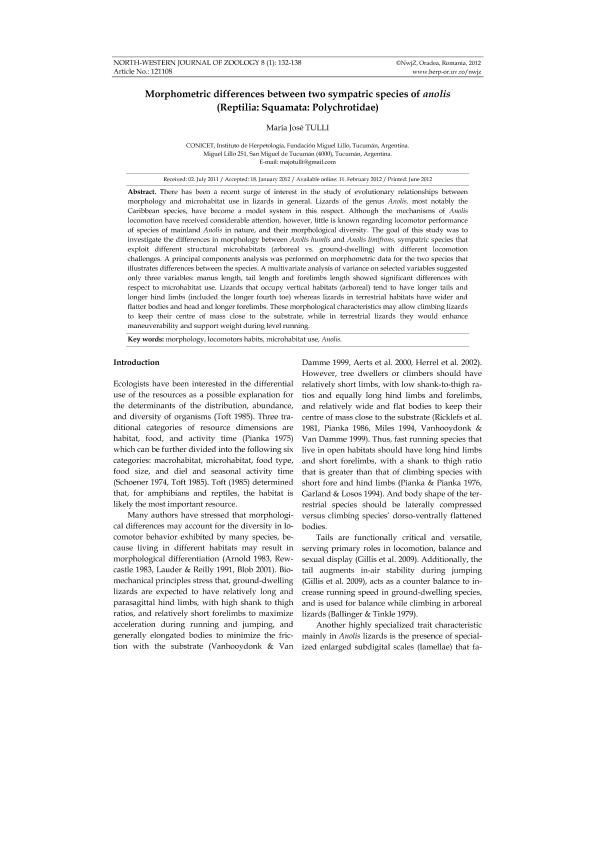Mostrar el registro sencillo del ítem
dc.contributor.author
Tulli, María José

dc.date.available
2017-12-14T18:25:57Z
dc.date.issued
2012-06
dc.identifier.citation
Tulli, María José; Morphometric differences between two sympatric species of anolis (Reptilia: Squamata: Polychrotidae) ; University of Oradea Publishing House; North Western Journal of Zoology; 8; 1; 6-2012; 132-138
dc.identifier.issn
1584-9074
dc.identifier.uri
http://hdl.handle.net/11336/30667
dc.description.abstract
There has been a recent surge of interest in the study of evolutionary relationships between morphology and microhabitat use in lizards in general. Lizards of the genus Anolis, most notably the Caribbean species, have become a model system in this respect. Although the mechanisms of Anolis locomotion have received considerable attention, however, little is known regarding locomotor performance of species of mainland Anolis in nature, and their morphological diversity. The goal of this study was to investigate the differences in morphology between Anolis humlis and Anolis limifrons, sympatric species that exploit different structural microhabitats (arboreal vs. ground-dwelling) with different locomotion challenges. A principal components analysis was performed on morphometric data for the two species that illustrates differences between the species. A multivariate analysis of variance on selected variables suggested only three variables: manus length, tail length and forelimbs length showed significant differences with respect to microhabitat use. Lizards that occupy vertical habitats (arboreal) tend to have longer tails and longer hind limbs (included the longer fourth toe) whereas lizards in terrestrial habitats have wider and flatter bodies and head and longer forelimbs. These morphological characteristics may allow climbing lizards to keep their centre of mass close to the substrate, while in terrestrial lizards they would enhance maneuverability and support weight during level running.
dc.format
application/pdf
dc.language.iso
eng
dc.publisher
University of Oradea Publishing House

dc.rights
info:eu-repo/semantics/openAccess
dc.rights.uri
https://creativecommons.org/licenses/by-nc-sa/2.5/ar/
dc.subject
Morphology
dc.subject
Locomotors Habits
dc.subject
Microhabitat Use
dc.subject
Anolis
dc.subject.classification
Zoología, Ornitología, Entomología, Etología

dc.subject.classification
Ciencias Biológicas

dc.subject.classification
CIENCIAS NATURALES Y EXACTAS

dc.title
Morphometric differences between two sympatric species of anolis (Reptilia: Squamata: Polychrotidae)
dc.type
info:eu-repo/semantics/article
dc.type
info:ar-repo/semantics/artículo
dc.type
info:eu-repo/semantics/publishedVersion
dc.date.updated
2016-11-17T16:03:51Z
dc.identifier.eissn
1843-5629
dc.journal.volume
8
dc.journal.number
1
dc.journal.pagination
132-138
dc.journal.pais
Rumania

dc.description.fil
Fil: Tulli, María José. Consejo Nacional de Investigaciones Científicas y Técnicas; Argentina. Fundación Miguel Lillo. Dirección de Zoología. Instituto de Herpetología; Argentina
dc.journal.title
North Western Journal of Zoology

dc.relation.alternativeid
info:eu-repo/semantics/altIdentifier/url/http://biozoojournals.ro/nwjz/content/v8n1/nwjz.121108.Tulli.pdf
Archivos asociados
